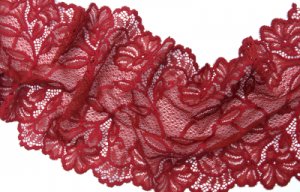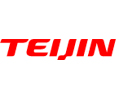
Tianhai Lace awarded Skin Friendly declaration for lace collection
Teijin Fibers Limited announced today that it has developed a new polyester fabric that is gentle on the human skin by stably maintaining its mildly acidic pH level, similar to healthy skin. Teijin says that it will be the world’s first commercial polyester material to offer pH control. Teijin Fibers will begin selling the new fabric in time for spring/ summer 2012 sportswear and it will also be marketed for general apparel and other applications. The fabric will be ex

7th January 2011
Innovation in Textiles
|
Tokyo
 Teijin Fibers Limited announced today that it has developed a new polyester fabric that is gentle on the human skin by stably maintaining its mildly acidic pH level, similar to healthy skin. Teijin says that it will be the world’s first commercial polyester material to offer pH control.
Teijin Fibers Limited announced today that it has developed a new polyester fabric that is gentle on the human skin by stably maintaining its mildly acidic pH level, similar to healthy skin. Teijin says that it will be the world’s first commercial polyester material to offer pH control.
Teijin Fibers will begin selling the new fabric in time for spring/ summer 2012 sportswear and it will also be marketed for general apparel and other applications. The fabric will be exhibited at two international sports trade shows in the near future: Outdoor Retailer in Salt Lake City, U.S.A. from January 20 to 23, and ISPO in Munich, Germany from February 6 to 9.
Teijin Fibers says it achieved the fabric’s mild acidity by modifying polyester polymer, rather than adhering agents to fibres, to enable it to maintain its pH level stably after repeated washing and wear, while also maintaining polyester’s superior characteristics such as water-absorption and quick-drying properties.
The fabric is expected to meet growing consumer demands for clothing with value-added properties such as gentleness to skin, odour prevention, and antibacterial and stain resistance.
Teijin says that presently, fabrics that possess such properties use agents that are adhered to their fibres through post-processing treatment, which can lead to low functionality, limited durability and a loss of original texture over time.
The company also says that fabrics offering pH control have been limited to water-absorbing (hydrophilic) fibres, such as cotton and rayon, neither of which sufficiently promotes the rapid drying of large amounts of perspiration, a basic requirement of high-performance sportswear.
Explaining how the new fabric works, Teijin says: “The skin of a healthy person generally is mildly acidic, but can become more alkaline due to sweating (summer) or drying (winter). The continuance of either condition for very long can result in odours and stains due to destructive bacteria which in turn can lead to increased susceptibility to the damaging effects of the sun’s ultraviolet rays.”
Teijin Fibers has modified its polyester polymer, which is intrinsically hydrophobic (neutral), to create localized hydrophilic properties and mild acidity on the fibre’s surface. As a result, the new fabric maintains its mildly acidic pH level even when the wearer is perspiring.
According to Teijin, the growth of bacteria such as Staphylococcus aureus and Corynebacterium, which cause odours and dry, rough skin, can be selectively controlled by the fabric’s mildly acidic state. This promotes the growth of beneficial bacteria such as Staphylococcus epidermidis, which helps to protect and maintain healthy skin, Teijin says.
In addition, alkaline components from sweat, such as ammonia, are said to be quickly absorbed and neutralized by the fabric’s mild acidity, which helps to prevent clothing from developing odours. The fabric’s hydrophilic surface is also said to enable washing to remove stains caused by sebum, an oily secretion on the skin, which minimizes the spread of bacteria and helps to maintain the clothing’s cleanliness.
The fabric’s mild acidity is also said to help to protect skin from ultraviolet rays by promoting the presence of beneficial bacteria.

Business intelligence for the fibre, textiles and apparel industries: technologies, innovations, markets, investments, trade policy, sourcing, strategy...
Find out more